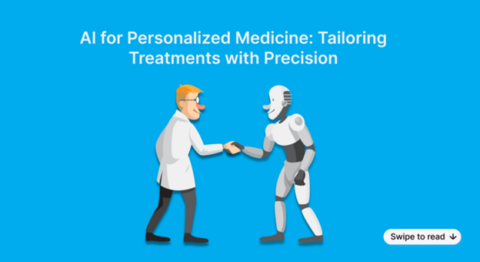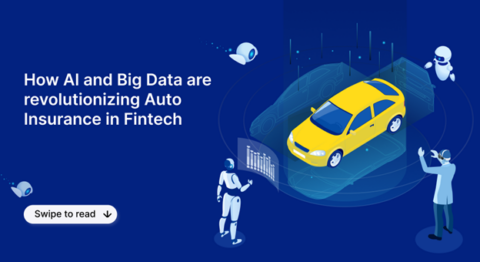
Artificial Intelligence is reshaping the landscape of software development, impacting both significant and subtle aspects. Beyond the rush to introduce AI-enabled features, its potential extends to a more foundational level. Looking ahead, AI is poised to serve as the cornerstone for the majority, if not all, Software as a Service (SaaS) solutions. Through the integration of machine learning and AI models, SaaS technologies are set to consistently enhance efficiencies across diverse business processes. AI isn’t just a feature; it’s laying the groundwork for an entirely new approach to development.
No matter where you find yourself on the AI journey, navigating through the myths and realities surrounding its role in our future work lives is crucial. In this blog we will debunk some myths related to AI’s role in the future of software development, More, importantly we will also discuss some of the tangible benefits of implementing AI in software development. From acting as an invaluable extension for software delivery to inherent the advantages AI brings to the overall software development process, We’ll explore how AI is shaping the future of software development.
Busting AI myths: What’s real and What’s not
Myth: AI will takeover technical jobs
Reality: AI won’t snatch away technical jobs; instead, it’s more like a reliable assistant for developers. While AI handles mundane tasks like code reviews and testing, it can’t match the creative and problem-solving skills of human developers. This collaboration means less time spent on repetitive chores and more on meaningful, innovative work, resulting in quicker development and higher-quality software.
Furthermore, let’s not forget – creating AI itself relies on human expertise, from data scientists to machine learning engineers. AI is a tool, not a replacement, boosting human efficiency and productivity. Job roles might shift, but AI is all about enhancing and creating, offering opportunities we haven’t even thought of yet. In the ever-evolving tech world, it’s a collaboration, not a takeover.
Myth: No one apart from data science can use AI
Reality: Forget the myth – you don’t need to be a data science guru to dive into AI. Sure, understanding data science basics helps, but it’s not a prerequisite for tapping into the power of AI.
Take pre-trained models, for instance. These are ready-to-roll models that have already done the heavy lifting on massive amounts of data. No need for a crash course in data science – just plug into these models via APIs, and you’re set. They can do tasks like image classification or language translation without you needing to know the ins and outs of data science.
Then there are AI-powered experiences, like voice assistants or chatbots. They use natural language processing, fueled by pre-trained models. You can seamlessly integrate these into your apps without needing a PhD in machine learning.
Remember, while you can use AI without data science know-how, having a basic grasp can help you navigate any quirks or biases that might pop up in AI solutions. It’s AI for all, not just the data wizards!
Myth: Non-technical users are the only ones who can use No-code/Low-code AI platforms
Reality: No code/low code platforms are the bridges between the tech-savvy and the tech-curious. These platforms offer a game-changing perk: they let anyone, tech background or not, whip up AI applications – be it chatbots or specialized search features. It’s a tech harmony, bringing both the coding maestros and the code-newbies into the software development groove. Non-techies get to flex their creative muscles with user-friendly interfaces and pre-built components, while tech whizzes can fine-tune and mesh these applications with other systems.
And here’s the surprise twist – even technical users find these platforms handy. Imagine a data scientist rapidly prototyping a machine learning model without drowning in code details.
From simple forms to advanced applications with machine learning, no code/low code platforms are the unsung heroes, letting organizations of all shapes and sizes tap into the AI magic without breaking the bank on pricey AI developers. It’s a win-win, where both techies and non-techies join forces to fast-track innovation and streamline business processes.
Impact of AI in software delivery
While agile methodologies have gained traction, achieving true continuous delivery remains a challenge for many businesses. AI steps in as a powerful ally, revolutionizing software delivery teams and making genuine agility attainable. Thanks to intelligent automation, teams can seamlessly deploy changes continuously.
How does this intelligent automation work? Imagine design systems being dynamically crafted and implemented by bots handling the intricate code. Self-generated proof-of-concepts ensure comprehensive feature testing right from the beginning. Integrated and ever-evolving test automation becomes the backbone, ensuring top-notch quality and a substantial acceleration in speed. With AI on board, software delivery becomes a smoother, more efficient journey towards achieving real agility.

How AI will affect software development roles
Companies must think about how AI fits into platform engineering and stay ahead of the game. With this emerging development approach, new job opportunities are on the horizon.
Business analysts will step up to lead business strategy
It’s likely that AI will handle writing individual user stories, requirements, and acceptance criteria. Instead of just noting criteria, business analysts will evaluate AI-generated ideas and align business goals with platform thinking. AI and technology will strongly influence business strategy, and business analysts will be at the forefront of this strategy branch.
Interaction design jobs will become more important than UI design roles
As visual AI advances, the need for UI designers to manually structure pages and business process flows will decrease. Interaction designers will play a key role in guiding AI to create UI and UX using JavaScript design systems, graphical guidelines, and continuous user testing.
Software architects will use the capabilities of AI.
Even though AI in software development is still in its early stages, we’re witnessing a swift rise in platform engineering. Companies are shifting away from specific SaaS solutions and combining custom-built and SaaS-enabled platforms like Salesforce, ServiceNow, and Workday. Currently, software architects are creating governance systems to steer code standards and development processes. Looking ahead, they will employ AI to construct, enforce, and enhance these systems on their behalf.

Benefits of AI in software development
By understanding the impact of artificial intelligence and its possibility of future enhancement in software development, you can realize the results of deploying AI technology. Here are the promising results due to the impact of artificial intelligence in software development:
Boosted data security
When developing software, never underestimate the importance of security. AI comes in handy by using machine learning to scrutinize data from various sources, spotting anomalies amidst regular behaviors. This not only enhances security but also helps Software Development Companies steer clear of delayed warnings, false notifications, and unnecessary alerts.
Simplified bug Identification
Integrating AI tools into the development process improves coding quality. Developers and testers find it easier to spot bugs without slogging through complex executable files. AI simplifies the process, making bug identification quick and corrections straightforward.
Strategic decision-making for better software
According to Diego Lo Giudice, a Forrester analyst, AI technologies like advanced machine learning, deep learning, and natural language processing empower software developers to create superior software at a faster pace. Machine learning solutions learn from past projects, analyze existing ones, and contribute to the development of better applications.
Enhanced estimation accuracy
AI revolutionizes software estimation by analyzing historical data, identifying correlations, and employing predictive analytics. By leveraging business rules, AI provides accurate estimates for cost, time, and effort, aiding in better project planning.
In conclusion, Artificial Intelligence is set to transform software design and creation significantly. Software development companies must grasp the potential benefits AI brings, not only in building software but also in shaping its very nature. Undoubtedly, AI in software development is a game-changer!










